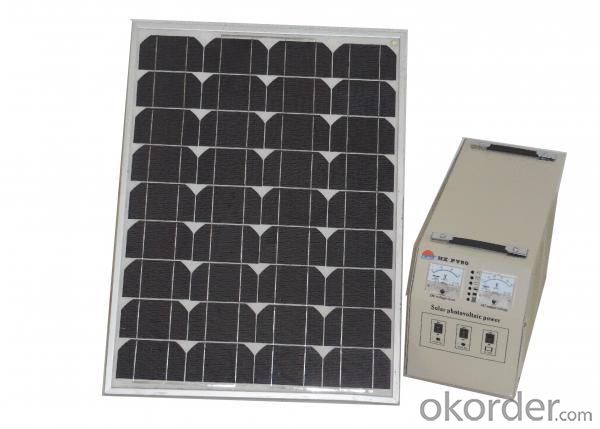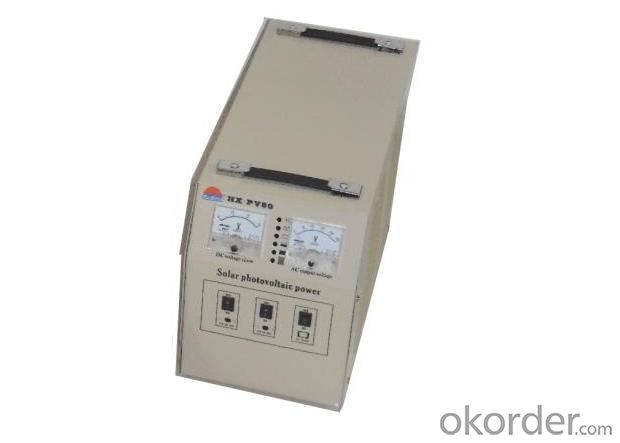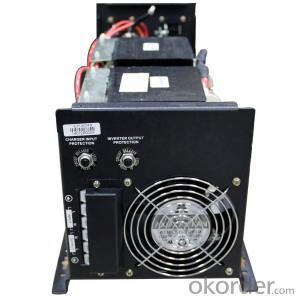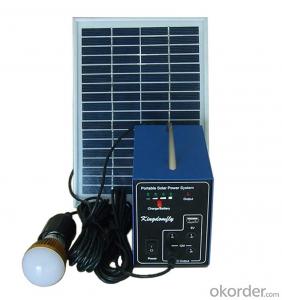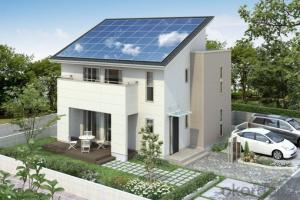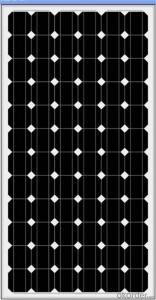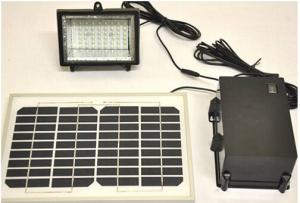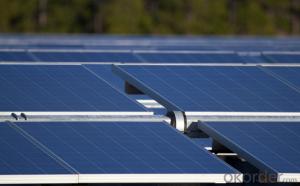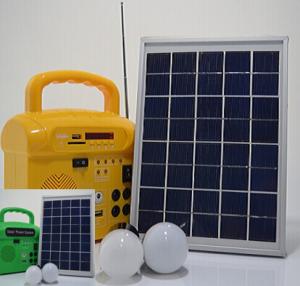Sunspot Solar Energy Systems CNBM-K1 (60W) Solar Home System
- Loading Port:
- China Main Port
- Payment Terms:
- TT or L/C
- Min Order Qty:
- 1 set set
- Supply Capability:
- 1000 sets per month set/month
OKorder Service Pledge
OKorder Financial Service
You Might Also Like
Brief Introduction of Solar Home System CNBM-K1 (60W)
CNBM Home System-K1 (60W) has a wonderful capacity.It can be used in factory,home,school and other CNBM Home System-K1 60W consist of the solar modules,charge controller,inverter and battery banks.
CNBM International is highly recognized by its business partners and clients all over the world and has obtained rapid development under the spirit of win-win .
With CNBM Home System-K1 (60W),
We will carry on the mutual beneficial,innovative and revolutionary trading structure as we did before,create value for our employees,share holders and clients and benefit the whole society in our future development.Please contact us ,if you have interest in CNBM Home
System-K1 (60W),don’t hesitate!
The Sketching of Solar Home System CNBM-K1 (60W)
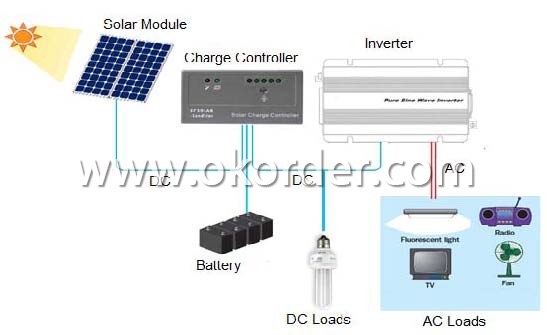
Components of Solar Home System CNBM-K1 (60W)
PV Array:
Convert sunlight instantly into DC electric power. Formed by the solar modules (also called photovoltaic modules) in accordance with the system requirements for series and parallel.
Solar Charge Controller:
A charge controller may be used to power DC equipment with solar panels. The charge controller provides a regulated DC output and stores excess energy in a battery as well as monitoring the battery voltage to prevent over charge or over discharge. An inverter can be connected to the output of a charge controller to drive AC loads.
Inverter:
Converts DC output power of photovaltaic soalr panels into standard AC power for use in the local off-grid electrical network. It is a critical component in a photovoltaic system, allowing the use of ordinary commercial appliances.
Battery banks:
Stores energy when there is an excess coming in and distribute it back out when there is a demand. Solar PV panels continue to re-charge batteries each day to maintain battery charge.
Technical data of Solar Home System CNBM-K1 (60W) | ||
Inverter | Rated load power | 500W |
Output wave | Modify sine wave | |
Output voltage | DC 12V | |
Output frequency | DC:12V AC:220V | |
Precision of output | 50HZ/60HZ | |
Precision of output frequency | ±6% | |
Solar panel | Pmax | 60W |
Vmp | 18.4V | |
Imp | 3.26A | |
Charger | Charger voltage & current | 12V 10A |
Battery | Capacity | 12V 30AH |
Power box | Spray paint iron box,with input,output,ammeter,voltmeter,master swith and so on. | |
Package of Solar Home System CNBM-K1 (60W) | ||||
Part | Size(L*W*H mm) | Weight(kg) | 20’(pcs) | 40’(pcs) |
Power box | 520*220*430 | 35 | 140 Sets | 320 Sets |
Solar panel | 630*670*30 | 6 | ||
Battery | 190*130*160 | 12 | ||
Factory Picture of Solar Home System CNBM-K1 (60W)
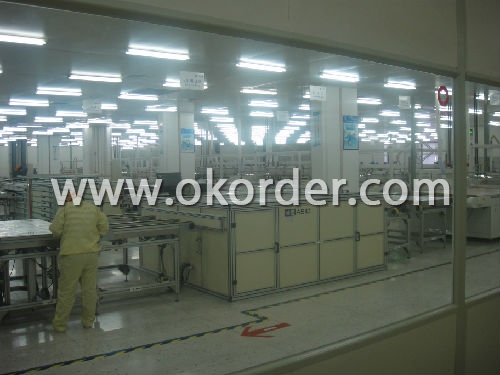
Package Picture of Solar Home System CNBM-K1 (60W)
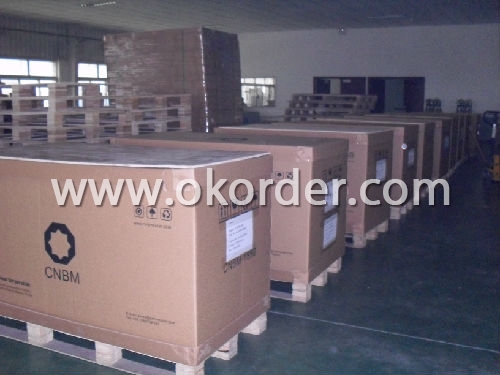
- Q: Can solar energy systems be used for powering residential or commercial air conditioning systems?
- Indeed, residential or commercial air conditioning systems can be powered by solar energy systems. Solar energy, whether harnessed through the utilization of solar panels or solar thermal systems, can be converted into electricity to fuel air conditioning units. The functioning of solar panels involves the capture of sunlight, which is then transformed into direct current (DC) electricity. Subsequently, an inverter converts this DC electricity into alternating current (AC) electricity, enabling it to power various appliances, including air conditioning systems. Alternatively, solar thermal systems utilize the sun's heat to directly power air conditioning units. This is accomplished by heating a fluid, such as water or refrigerant, which is then employed to cool the air. By opting for solar energy systems to power air conditioning, not only can electricity bills be reduced, but carbon emissions can also be minimized, making this an environmentally sustainable and economically viable solution for both residential and commercial structures.
- Q: Are there any noise or sound issues with solar energy systems?
- Solar energy systems do not typically cause noise or sound problems. Unlike fossil fuel power plants or wind turbines, solar panels do not have any components that move and create noise. They simply transform sunlight into electricity using photovoltaic cells, which is a quiet process. The only potential noise issue with solar energy systems could come from the inverters, which convert the direct current (DC) generated by the panels into alternating current (AC) for use in homes or businesses. However, modern inverters are designed to operate silently or produce minimal noise levels, often comparable to the background hum of household appliances. Consequently, noise or sound problems are generally not a concern with solar energy systems.
- Q: What is the impact of solar energy systems on water usage?
- Solar energy systems have a positive impact on water usage due to their inherent nature of generating electricity without the need for water. Traditional forms of electricity generation, such as coal or natural gas power plants, require substantial amounts of water for cooling and steam generation. In contrast, solar energy systems do not rely on water for their operation, making them an environmentally friendly alternative. By utilizing solar energy, we can significantly reduce the water consumption associated with electricity generation. This is particularly crucial in regions facing water scarcity or drought conditions. With solar power, there is no need for water-intensive cooling processes, saving millions of gallons of water annually. Furthermore, solar energy systems can also contribute to water conservation indirectly. As solar power becomes more prevalent, it reduces the demand for fossil fuels, which often require substantial amounts of water for extraction and processing. By transitioning to solar energy, we can lessen the strain on water resources that are used in traditional energy production. Additionally, solar energy systems can be combined with innovative technologies such as solar water heaters, which utilize the sun's energy to heat water for domestic or industrial use. This reduces the reliance on conventional water heaters that consume significant amounts of electricity or gas. Overall, the impact of solar energy systems on water usage is highly beneficial. They reduce water consumption in electricity generation, indirectly conserve water by reducing the demand for fossil fuels, and can even be utilized for water heating purposes. Embracing solar energy helps us mitigate the strain on water resources and move towards a more sustainable future.
- Q: Do solar energy systems require a lot of space?
- Solar energy systems do not require a significant amount of space. While larger systems may need more space, smaller systems like rooftop solar panels can be installed on existing structures, making them a space-efficient option for generating clean energy.
- Q: Can solar energy systems be used to heat water?
- Yes, solar energy systems can be used to heat water through the use of solar thermal collectors or solar water heaters. These systems absorb sunlight and convert it into heat, which is then used to warm the water for various purposes such as domestic use, swimming pools, or even industrial processes.
- Q: Can solar energy systems be used in camping or outdoor activities?
- Certainly, solar energy systems are applicable for camping or outdoor activities. In reality, solar power proves to be an excellent solution for living off-grid or when you are away from conventional power sources. You can employ portable solar panels, also known as solar chargers, to harness the sun's energy and convert it into electricity, thus powering various camping or outdoor devices. Using solar energy systems for camping offers numerous advantages. Firstly, they provide a renewable and sustainable power source, reducing your reliance on fossil fuels or disposable batteries. This not only benefits the environment but also saves you money in the long term. Solar energy systems can charge a wide range of devices, including smartphones, tablets, laptops, cameras, portable speakers, and even small appliances like coolers or lights. This ensures that you can stay connected, capture memories, or enhance your camping experience without worrying about battery life. Portable solar panels are lightweight, compact, and easy to carry, making them perfect for camping or outdoor activities. They can be set up in various ways, such as attaching them to a backpack, placing them on the ground, or mounting them on a tent or RV. Some solar chargers even feature integrated batteries, allowing you to store energy for later use and ensuring a constant power supply, even on cloudy days or at night. It is important to note that the efficiency and power output of solar energy systems may vary depending on factors like weather conditions, panel quality, and the angle at which they are positioned towards the sun. Therefore, it is crucial to select reliable and reputable solar products that suit your specific needs. All in all, solar energy systems offer a fantastic option for camping or outdoor activities, providing a clean, reliable, and sustainable power source. Whether you need to charge your devices, illuminate your campsite, or power small appliances, solar power can greatly enhance your outdoor experience.
- Q: Can solar energy systems be used in disaster-prone areas?
- Certainly, solar energy systems have the potential to be utilized in areas prone to disasters. In reality, they can prove particularly advantageous in such regions. Conventional power grids often prove to be fragile and susceptible to damage during natural calamities such as hurricanes, earthquakes, or floods. Consequently, these events can result in prolonged periods without electricity, hindering relief and recovery efforts. On the other hand, solar energy systems are decentralized and can operate independently from the grid. These systems consist of solar panels that convert sunlight into electricity, which can then be stored in batteries for use during power outages. This enables critical facilities, including hospitals, emergency response centers, and shelters, to function even when the grid is not operational. Solar energy systems can provide a reliable source of power for lighting, communication, refrigeration, and medical equipment, significantly enhancing the resilience and efficacy of disaster response. Moreover, solar energy systems can also be employed to power water pumps, ensuring that communities have access to clean water during crises. This is particularly crucial in disaster-prone areas where access to safe drinking water can be severely compromised. Solar-powered pumps can extract water from wells, rivers, or other sources, ensuring a consistent supply for drinking, sanitation, and hygiene purposes. Additionally, solar energy systems can contribute to long-term recovery efforts in disaster-prone areas. By reducing reliance on fossil fuels and conventional power grids, they can aid in the creation of sustainable and resilient communities. Solar panels can be installed on rooftops or in open spaces, utilizing the abundance of sunlight resources. This not only reduces greenhouse gas emissions and mitigates climate change but also provides a dependable and cost-effective source of energy for homes, businesses, and public infrastructure. In conclusion, solar energy systems can effectively serve disaster-prone areas by providing dependable power, supporting critical services, and promoting long-term resilience. By harnessing the power of the sun, these systems offer a sustainable and decentralized solution to energy needs, ensuring that communities can withstand and recover from natural disasters more effectively.
- Q: Can solar energy systems be used for powering electric bikes?
- Yes, solar energy systems can be used to power electric bikes. Solar panels can be installed on rooftops or other suitable areas to capture sunlight and convert it into electricity. This electricity can then be used to charge the batteries of electric bikes, providing a sustainable and renewable source of power.
- Q: Do solar energy systems require specialized cleaning?
- Yes, solar energy systems do require specialized cleaning. While solar panels are designed to be self-cleaning to some extent, they can still accumulate dirt, dust, pollen, bird droppings, and other debris over time, which can reduce their efficiency. Regular cleaning is necessary to ensure optimal performance. However, cleaning solar panels can be a delicate task, as they are made of sensitive materials. Using the wrong cleaning products or techniques can damage the panels and void their warranty. Therefore, it is recommended to hire professionals or follow the manufacturer's guidelines for cleaning solar energy systems.
- Q: Do solar energy systems require a backup battery system?
- Solar energy systems do not necessarily require a backup battery system, but it can be beneficial to have one depending on your specific needs and circumstances. Solar energy systems generate electricity from the sun and can be connected to the grid, allowing excess energy to be sold back to the utility company. This means that during times when the sun is not shining, such as at night or during cloudy weather, you can still draw electricity from the grid. However, having a backup battery system can provide several advantages. First, it allows you to store excess energy generated during the day for use at night or during power outages. This can provide you with a reliable source of electricity even when the grid is down. Additionally, a backup battery system can provide a more consistent power supply. When connected to the grid, solar energy systems typically shut down during power outages to ensure the safety of utility workers. With a backup battery system, you can continue to power your essential appliances and devices during these outages. Furthermore, having a backup battery system can provide energy independence. By storing your own energy, you can reduce reliance on the grid and potentially offset the cost of electricity bills even further. Ultimately, the decision to install a backup battery system for a solar energy system depends on your specific energy needs, budget, and preferences. Consulting with a solar energy professional can help you determine the best solution for your situation.
Send your message to us
Sunspot Solar Energy Systems CNBM-K1 (60W) Solar Home System
- Loading Port:
- China Main Port
- Payment Terms:
- TT or L/C
- Min Order Qty:
- 1 set set
- Supply Capability:
- 1000 sets per month set/month
OKorder Service Pledge
OKorder Financial Service
Similar products
Hot products
Hot Searches
Related keywords



